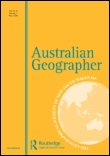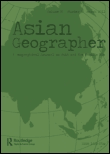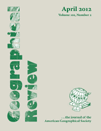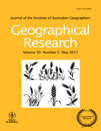
AUSTRALIAN GEOGRAPHER
Scope & Guideline
Charting New Territories in Geographic Research
Introduction
Aims and Scopes
- Environmental Geography and Sustainability:
The journal frequently addresses topics related to environmental change, sustainability practices, and ecological justice, reflecting a commitment to understanding how human activities impact natural systems. - Urban Studies and Planning:
Publications often explore urban dynamics, planning, and the experiences of marginalized communities in urban settings, highlighting issues of social justice and equity in city development. - Cultural and Social Geography:
The journal examines identity, place-making, and the cultural dimensions of geography, including indigenous perspectives and the experiences of diverse communities within Australia. - Mobility and Migration Studies:
Research on mobility patterns, migration dynamics, and their implications for communities and regions is a significant focus, addressing contemporary challenges such as refugee settlement and transnational migration. - Regional Development and Change:
The journal contributes to discussions on regional development, demographic changes, and the socio-economic factors affecting various Australian regions, particularly in light of recent events like the COVID-19 pandemic.
Trending and Emerging
- Climate Change and Environmental Justice:
Recent publications emphasize the intersection of climate change with social justice, exploring how marginalized communities are disproportionately affected and how policies can address these inequities. - Urban Resilience and Smart Cities:
There is a growing focus on urban resilience, smart city initiatives, and innovative urban planning strategies that promote sustainability and community engagement in city development. - Mobility Justice:
The concept of mobility justice has gained traction, with studies exploring the implications of mobility for social inclusion and the rights of various populations, including refugees and indigenous communities. - Indigenous Perspectives and Rights:
Research increasingly incorporates indigenous knowledge systems and rights, reflecting a broader recognition of the importance of indigenous voices in geographical scholarship. - Post-Pandemic Urban Studies:
The impact of the COVID-19 pandemic on urban and regional dynamics is a trending topic, with studies addressing shifts in migration patterns, community resilience, and changes in urban living.
Declining or Waning
- Traditional Land Use Studies:
There seems to be a waning focus on conventional land use studies and agricultural geography, as newer themes related to sustainability and urban environments take precedence. - Historical Geography:
Research grounded in historical geography has decreased, possibly due to a growing emphasis on contemporary issues and immediate environmental concerns over historical analyses. - Purely Quantitative Geographic Studies:
There is a noticeable decline in studies that rely solely on quantitative methods without qualitative insights, as the journal increasingly values interdisciplinary approaches that incorporate qualitative data.
Similar Journals

GEOGRAFICKY CASOPIS-Geographical Journal
Navigating the landscape of contemporary geographical research.GEOGRAFICKY CASOPIS-Geographical Journal is a prestigious publication dedicated to advancing knowledge in the fields of geography and earth sciences, published by the SLOVAK ACADEMY OF SCIENCES, INSTITUTE OF GEOGRAPHY. With a rich history dating back to its inception in 1976, the journal serves as a vital forum for researchers and professionals to disseminate their findings across a range of topics including earth-surface processes, geography, planning, development, and geology. Notably, it maintains a respectable Q3 category ranking across these disciplines as of 2023, indicating its contribution to relevant academic discourse. The journal is indexed under critical databases and engages a global audience, making it an essential resource for scholars seeking to stay informed about contemporary issues and advancements in geography. Although currently not an open-access journal, it emphasizes the sharing of significant research findings and encourages submissions from various geographical contexts to enrich the scientific community. Geographical Journal's commitment to fostering interdisciplinary dialogue ensures its relevance and importance in shaping the future of geographical research.

Letters in Spatial and Resource Sciences
Fostering Dialogue on Urban and Resource SustainabilityLetters in Spatial and Resource Sciences, published by Springer Heidelberg, is a prestigious journal dedicated to the interdisciplinary exploration of spatial and resource-related issues within the fields of demography, economics, geography, planning, and urban studies. Since its inception in 2008, this journal has provided a platform for cutting-edge research, facilitating the exchange of innovative ideas and methodologies that address contemporary challenges in spatial dynamics and resource allocation. With an impact factor reflecting its robust standing in academic circles (notably ranking Q2 in Demography and Geography, and Q3 in Economics and Econometrics as of 2023), it serves as an essential resource for scholars and practitioners alike. The journal is committed to fostering open dialogue and advancing the understanding of spatial phenomena, making it a vital asset for anyone engaged in these dynamic areas of study. Targeting a diverse audience, from researchers to industry professionals, it aims to enhance scholarly communication and promote evidence-based solutions to spatial and resource dilemmas.

CyberGeo-European Journal of Geography
Exploring the Frontiers of Geographical KnowledgeCyberGeo-European Journal of Geography, published by CYBERGEO, is a leading open-access journal that has been at the forefront of geographical research since its inception in 1996. With a dedicated focus on the multifaceted dimensions of geography, the journal aims to disseminate innovative and critical insights into geographical phenomena in Europe and beyond. The journal has established itself in the academic community, currently holding the Q3 quartile ranking in the Social Sciences (miscellaneous) category for 2023 and recognized within Scopus as #428 out of 604, placing it in the 29th percentile. CyberGeo publishes original research articles, thematic issues, and reviews that contribute to the advancement of geographical knowledge, making it an essential resource for researchers, professionals, and students alike. Situated in Paris, France, the journal embraces a truly international perspective and invites contributions that stimulate scholarly debate and further the understanding of spatial dynamics. By providing open access to its content, CyberGeo ensures that its research is accessible to a global audience, promoting knowledge sharing and collaborative exploration in the field of geography.

MITTEILUNGEN DER OSTERREICHISCHEN GEOGRAPHISCHEN GESELLSCHAFT
Illuminating the Landscape of Earth-Surface ProcessesMITTEILUNGEN DER OSTERREICHISCHEN GEOGRAPHISCHEN GESELLSCHAFT, published by the Österreichische Geographische Gesellschaft, serves as a vital resource within the fields of Geography and Earth-Surface Processes. This journal, with the ISSN 0029-9138, offers a platform for scholarly articles that contribute to the understanding of geographical phenomena, particularly focusing on regional and environmental issues based in Austria since its establishment. Although lacking Open Access options, the journal maintains rigorous publication standards and has seen converged issues from 1978 to 2008, and from 2011 to 2018, alongside recent volumes from 2020 to 2023. As a Q4 ranked journal in the Scopus categories for Geography, Planning and Development, and Earth-Surface Processes, it is strategically positioned to support researchers, professionals, and students striving to enhance geographical knowledge. As such, MITTEILUNGEN DER OSTERREICHISCHEN GEOGRAPHISCHEN GESELLSCHAFT continues to foster geographical discourse and innovation, contributing significantly to the academic community.

Asian Geographer
Charting New Territories in Asian GeographyAsian Geographer is a prominent journal published by Routledge Journals, Taylor & Francis Ltd, recognized for its significant contributions to the field of geography, planning, and development. With an ISSN of 1022-5706 and an E-ISSN of 2158-1762, the journal offers a platform for high-quality, peer-reviewed research that addresses vital geographical issues, particularly within the Asian context. The journal's commitment to fostering informed discourse is reflected in its Q2 category ranking in the field of Geography, Planning and Development as of 2023, and its Scopus ranking of #274 out of 821 in the same category, placing it in the 66th percentile. The Asian Geographer serves as an essential resource for researchers, professionals, and students alike, ensuring access to a wealth of knowledge that influences policy and practice. It continues to publish original research and reviews as it converges to present significant developments in geography from 1982 to 1987, 1991 to 1995, and from 2015 to 2024. This journal is vital for anyone looking to deepen their understanding of geographical dynamics in Asia and beyond.

GEOGRAPHICAL REVIEW
Advancing Knowledge in Spatial Analysis and Environmental ProcessesGEOGRAPHICAL REVIEW, published by Taylor & Francis Inc, is a premier academic journal recognized for its influential contributions to the fields of geography and earth-surface processes. With an ISSN of 0016-7428 and an E-ISSN of 1931-0846, this journal has established itself as a vital resource for researchers, professionals, and students alike. The journal maintains a strong reputation with a Q1 ranking in both Earth-Surface Processes and Geography, Planning and Development, reflecting its scholarly impact and relevance in the academic community. Additionally, it holds a notable position in Scopus rankings, placing #181 out of 821 in Social Sciences and #45 out of 179 in Earth and Planetary Sciences. Although it is not open access, the GEOGRAPHICAL REVIEW remains essential for those seeking to expand their understanding of spatial analysis and environmental processes from its historical inception in 1969 to its ongoing publications through 2024. Explore rigorous research articles, critical reviews, and innovative studies that shape the discourse in geography and earth sciences today.

Habitat y Sociedad
Fostering Interdisciplinary Dialogue for Sustainable FuturesHabitat y Sociedad is a distinguished peer-reviewed journal published by UNIV SEVILLA, EDITORIAL, that focuses on the intricate interplay between human habitats and societal dynamics. With ISSN 2173-125X, this journal offers a platform for scholarly articles that explore themes related to human geography, urban studies, and the social impacts of environmental changes. As an essential resource for researchers, professionals, and students alike, it promotes interdisciplinary dialogue and advances knowledge in the field of habitat studies. Although specific impact factors and H-index metrics are currently unavailable, the journal is dedicated to ensuring high academic standards and providing open access to its content, fostering a collaborative research environment. Located in the historic city of Seville, Spain, this journal not only supports regional studies but also contributes to global conversations on sustainable habitation and societal development.

Geo UERJ
Unveiling Insights into Our Planet's DynamicsGeo UERJ is a renowned open-access journal published by Universidade do Estado do Rio de Janeiro (UNIV ESTADO RIO JANEIRO), focused on the multifaceted study of geography and related disciplines. Established to foster innovation and disseminate high-quality research, Geo UERJ has been dedicated to making scholarly work accessible since its transition to open access in 2007. The journal aims to provide a platform for researchers, professionals, and students to share insights into geographical phenomena, environmental issues, and urban studies, contributing to the global discourse on sustainability and spatial analysis. Its publications serve as valuable resources for academicians looking to stay abreast of cutting-edge developments within the geography field. With the ISSN 1415-7543 and E-ISSN 1981-9021, Geo UERJ invites contributions from diverse perspectives, enriching the academic landscape with important geographic research from Brazil and beyond.

Geographical Research
Advancing Insights in Geography and PlanningGeographical Research, published by WILEY, is a premier academic journal based in the United Kingdom, dedicated to advancing knowledge in the fields of Geography, Planning, and Earth-Surface Processes. With an impact factor that reflects its high academic caliber, this journal ranks in the Q2 category for Earth-Surface Processes and Q1 in Geography, Planning and Development, highlighting its influential role in shaping contemporary research within these disciplines. The journal's Scopus rankings further underscore its significance, standing at #175 out of 821 in Geography, and #41 out of 179 in Earth-Surface Processes, placing it within the top 78th and 77th percentiles, respectively. Since its inception in 2005, Geographical Research has continuously provided a vital platform for scholars to disseminate innovative research, fostering dialogue and collaboration across disciplines. Although currently not open access, its content remains indispensable for researchers, professionals, and students aiming to deepen their understanding of geographical phenomena and develop strategic insights for planning and development.

Southeastern Geographer
Unveiling the Rich Tapestry of Southeastern GeographyThe Southeastern Geographer is a prominent academic journal published by the Association of American Geographers, dedicated to advancing knowledge in the fields of Earth and Planetary Sciences and Geography, Planning and Development. With an ISSN of 0038-366X and an E-ISSN of 1549-6929, this journal has been a staple in geographical scholarship since its inception, offering a platform for diverse research that spans over four decades, specifically from 1979 to 1994 and then from 1996 to 2024. The journal is currently classified in the Q3 category within its fields, indicating its significant influence in shaping contemporary geographical discourse. Researchers, professionals, and students alike benefit from its rigorously peer-reviewed articles that explore regional studies, environmental issues, and sociocultural dynamics, making it essential for anyone interested in the interconnectedness of geography and society. As a vital resource for advancing geographical education and research, the Southeastern Geographer continues to engage its audience with innovative insights and scholarly contributions.